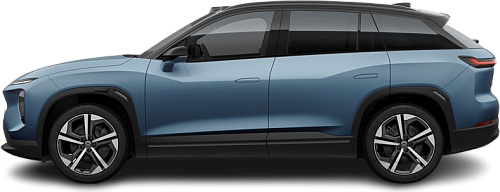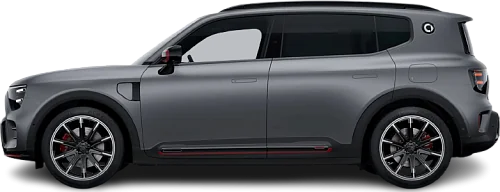Global EV Comparison: NIO EL7 Standard Range vs Smart #5 Brabus
Struggling to Decide? Let AI Help!
Your AI Summary Is Ready!
General Info
Both vehicles are currently in production and can be purchased new. The NIO EL7 Standard Range (2022-…) has a starting price of €85900, compared to the Smart #5 Brabus (2025-…), which starts at €60900.
The two vehicles share the same body style: SUV.
| Property | NIO EL7 Standard Range | Smart #5 Brabus |
|---|---|---|
| Years of Production | 2022-… | 2025-… |
| Current Status | Produced | Produced |
| Country of Manufacture | China | China |
| Body Style | SUV | SUV |
| Market Availability | EU | EU |
| Price Europe (New) | €85900 | €60900 |
| GCC Score | 6.4 | 7.9 |
Range and Efficiency
The Smart #5 Brabus (2025-…) boasts a greater real-world range, a larger battery, and superior energy efficiency compared to the NIO EL7 Standard Range (2022-…).
| Property | NIO EL7 Standard Range | Smart #5 Brabus |
|---|---|---|
| Range (WLTP) | 394 km | 540 km |
| Range (GCC) | 335 km | 459 km |
| Battery Capacity (Nominal) | 75 kWh | 100 kWh |
| Battery Capacity (Usable) | 73.5 kWh | 94 kWh |
| Efficiency per 100 km | 21.9 kWh/100 km | 20.5 kWh/100 km |
| Efficiency per kWh | 4.56 km/kWh | 4.88 km/kWh |
| Range and Efficiency Score | 4.7 | 6.7 |
Charging
The Smart #5 Brabus (2025-…) features an advanced 800-volt architecture, whereas the NIO EL7 Standard Range (2022-…) relies on a standard 400-volt system.
The Smart #5 Brabus (2025-…) offers faster charging speeds at DC stations, reaching up to 400 kW, while the NIO EL7 Standard Range (2022-…) maxes out at 140 kW.
The Smart #5 Brabus (2025-…) features a more powerful on-board charger, supporting a maximum AC charging power of 22 kW, whereas the NIO EL7 Standard Range (2022-…) is limited to 11 kW.
| Property | NIO EL7 Standard Range | Smart #5 Brabus |
|---|---|---|
| Max Charging Power (AC) | 11 kW | 22 kW |
| Max Charging Power (DC) | 140 kW | 400 kW |
| Architecture | 400 V | 800 V |
| Charge Port | CCS Type 2 | CCS Type 2 |
| Charging Score | 6.2 | 10 |
Performance
Both vehicles are all-wheel drive.
Although the NIO EL7 Standard Range (2022-…) has more power, the Smart #5 Brabus (2025-…) achieves a faster 0-100 km/h time.
| Property | NIO EL7 Standard Range | Smart #5 Brabus |
|---|---|---|
| Drive Type | AWD | AWD |
| Motor Type | PMSM (front), IM (rear) | PMSM (front), PMSM (rear) |
| Motor Power (kW) | 480 kW | 475 kW |
| Motor Power (hp) | 644 hp | 637 hp |
| Motor Torque | 850 Nm | 710 Nm |
| 0-100 km/h | 3.9 s | 3.8 s |
| Top Speed | 200 km/h | 210 km/h |
| Performance Score | 6.7 | 6.6 |
Dimensions
The NIO EL7 Standard Range (2022-…) is longer and wider, but about the same height as the Smart #5 Brabus (2025-…).
The NIO EL7 Standard Range (2022-…) boasts a more extended wheelbase.
| Property | NIO EL7 Standard Range | Smart #5 Brabus |
|---|---|---|
| Length | 4912 mm | 4695 mm |
| Width (with Mirrors) | 2271 mm | 2169 mm |
| Width (w/o Mirrors) | 1987 mm | 1920 mm |
| Height | 1720 mm | 1705 mm |
| Wheelbase | 2960 mm | 2900 mm |
Cargo and Towing
The Smart #5 Brabus (2025-…) features a larger trunk, but the NIO EL7 Standard Range (2022-…) offers greater maximum cargo capacity when the rear seats are folded.
A frunk (front trunk) is available in the Smart #5 Brabus (2025-…), but the NIO EL7 Standard Range (2022-…) doesn’t have one.
The NIO EL7 Standard Range (2022-…) is better suited for heavy loads, offering a greater towing capacity than the Smart #5 Brabus (2025-…).
| Property | NIO EL7 Standard Range | Smart #5 Brabus |
|---|---|---|
| Number of Seats | 5 | 5 |
| Curb Weight | 2421 kg | 2378 kg |
| Cargo Volume (Trunk) | 570 l | 630 l |
| Cargo Volume (Max) | 1545 l | 1530 l |
| Cargo Volume (Frunk) | - Cargo Volume (Frunk) | 47 l |
| Towing Capacity | 2000 kg | 1600 kg |
| Cargo and Towing Score | 7.8 | 7.4 |




